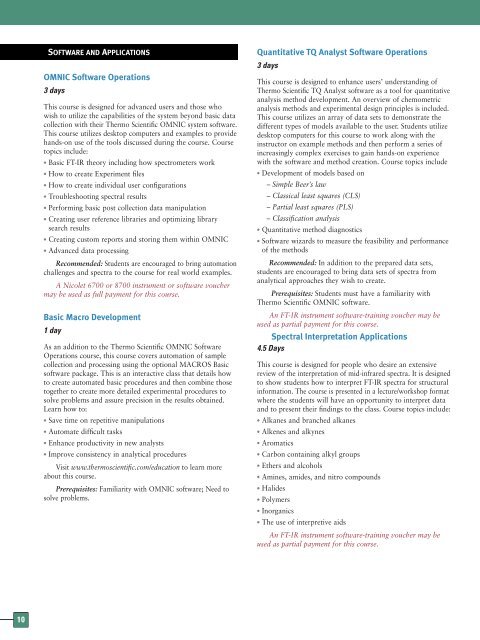Thermo Scientific LIFECYCLE Education Services Course Catalog
Thermo Scientific LIFECYCLE Education Services Course Catalog
Thermo Scientific LIFECYCLE Education Services Course Catalog
You also want an ePaper? Increase the reach of your titles
YUMPU automatically turns print PDFs into web optimized ePapers that Google loves.
10<br />
SOFTWARE AND APPLICATIONS<br />
OMNIC Software Operations<br />
3 days<br />
This course is designed for advanced users and those who<br />
wish to utilize the capabilities of the system beyond basic data<br />
collection with their <strong>Thermo</strong> <strong>Scientific</strong> OMNIC system software.<br />
This course utilizes desktop computers and examples to provide<br />
hands-on use of the tools discussed during the course. <strong>Course</strong><br />
topics include:<br />
• Basic FT-IR theory including how spectrometers work<br />
• How to create Experiment files<br />
• How to create individual user configurations<br />
• Troubleshooting spectral results<br />
• Performing basic post collection data manipulation<br />
• Creating user reference libraries and optimizing library<br />
search results<br />
• Creating custom reports and storing them within OMNIC<br />
• Advanced data processing<br />
Recommended: Students are encouraged to bring automation<br />
challenges and spectra to the course for real world examples.<br />
A Nicolet 6700 or 8700 instrument or software voucher<br />
may be used as full payment for this course.<br />
Basic Macro Development<br />
1 day<br />
As an addition to the <strong>Thermo</strong> <strong>Scientific</strong> OMNIC Software<br />
Operations course, this course covers automation of sample<br />
collection and processing using the optional MACROS Basic<br />
software package. This is an interactive class that details how<br />
to create automated basic procedures and then combine those<br />
together to create more detailed experimental procedures to<br />
solve problems and assure precision in the results obtained.<br />
Learn how to:<br />
• Save time on repetitive manipulations<br />
• Automate difficult tasks<br />
• Enhance productivity in new analysts<br />
• Improve consistency in analytical procedures<br />
Visit www.thermoscientific.com/education to learn more<br />
about this course.<br />
Prerequisites: Familiarity with OMNIC software; Need to<br />
solve problems.<br />
Quantitative TQ Analyst Software Operations<br />
3 days<br />
This course is designed to enhance users’ understanding of<br />
<strong>Thermo</strong> <strong>Scientific</strong> TQ Analyst software as a tool for quantitative<br />
analysis method development. An overview of chemometric<br />
analysis methods and experimental design principles is included.<br />
This course utilizes an array of data sets to demonstrate the<br />
different types of models available to the user. Students utilize<br />
desktop computers for this course to work along with the<br />
instructor on example methods and then perform a series of<br />
increasingly complex exercises to gain hands-on experience<br />
with the software and method creation. <strong>Course</strong> topics include<br />
• Development of models based on<br />
– Simple Beer’s law<br />
– Classical least squares (CLS)<br />
– Partial least squares (PLS)<br />
– Classification analysis<br />
• Quantitative method diagnostics<br />
• Software wizards to measure the feasibility and performance<br />
of the methods<br />
Recommended: In addition to the prepared data sets,<br />
students are encouraged to bring data sets of spectra from<br />
analytical approaches they wish to create.<br />
Prerequisites: Students must have a familiarity with<br />
<strong>Thermo</strong> <strong>Scientific</strong> OMNIC software.<br />
An FT-IR instrument software-training voucher may be<br />
used as partial payment for this course.<br />
Spectral Interpretation Applications<br />
4.5 Days<br />
This course is designed for people who desire an extensive<br />
review of the interpretation of mid-infrared spectra. It is designed<br />
to show students how to interpret FT-IR spectra for structural<br />
information. The course is presented in a lecture/workshop format<br />
where the students will have an opportunity to interpret data<br />
and to present their findings to the class. <strong>Course</strong> topics include:<br />
• Alkanes and branched alkanes<br />
• Alkenes and alkynes<br />
• Aromatics<br />
• Carbon containing alkyl groups<br />
• Ethers and alcohols<br />
• Amines, amides, and nitro compounds<br />
• Halides<br />
• Polymers<br />
• Inorganics<br />
• The use of interpretive aids<br />
An FT-IR instrument software-training voucher may be<br />
used as partial payment for this course.


